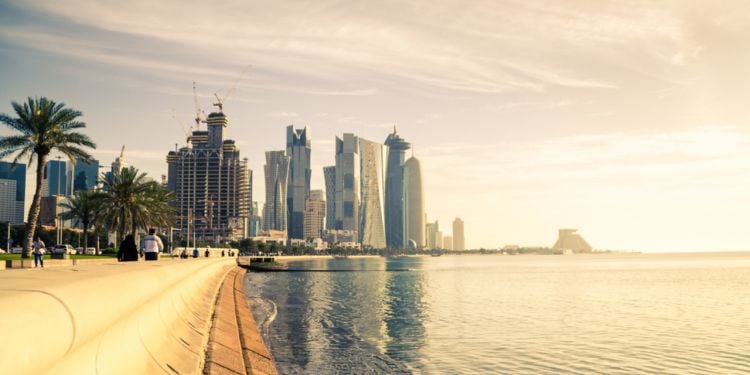
Over the years, Qatar has fully developed its economy, which today attracts expatriates from around the world. More and more foreign professionals are looking to boost their careers in Doha thanks to the number of opportunities available in various fields. The country's impressive development impressed global investors, who now contribute significantly to its economy. These investments have opened a tremendous gateway to different jobs, from facilities and services to information and communication technology.
The most promising fields in Doha
Some key sectors that contribute to the city's economy include oil and gas, finance, construction, education, healthcare, hospitality, information technology, and transportation. Expatriates in Doha often find job opportunities in industries such as engineering, finance, healthcare, education, and technology.
Oil and Gas
Qatar has a significant presence in the oil and gas industry, with major companies such as Qatar Petroleum leading the sector. Job opportunities in this industry include roles in exploration, production, refining, distribution, and related services.
Here are several companies operating in the oil and gas industry in Qatar that may have employment opportunities:
- QatarEnergy (formerly known as Qatar Petroleum (QP)
- Qatargas
- Total Energies
- ExxonMobil Qatar
- Shell Qatar
Please note that the job market and hiring needs can fluctuate, so it is important to regularly check the websites of these companies, as well as online job portals, for the most up-to-date information on available positions.
Salaries for expats in the oil and gas sector in Qatar can vary significantly depending on factors such as job position, experience, qualifications, and the specific company. The oil and gas industry in Qatar generally offers competitive salaries to attract and retain skilled professionals. Here is a rough estimate of salary ranges in QAR for some common roles in the oil and gas sector:
The salaries for entry-level positions in the oil and gas sector can range from around 10,000 QAR to 18,000 QAR per month.
Mid-level professionals with a few years of experience can expect monthly salaries ranging from 18,000 QAR to 30,000 QAR.
Senior-level professionals with extensive experience and specialized expertise in the oil and gas sector can earn salaries ranging from 30,000 QAR to 60,000 QAR per month or higher.
It's important to note that these figures are approximate and can vary depending on individual qualifications, experience, the specific role within the industry (engineering, management, technical, etc.), and the company's policies. Other benefits, such as housing allowances, transportation allowances, and healthcare coverage, may also be provided as part of the compensation package.
To get a more accurate understanding of salary expectations in the oil and gas sector, it is advisable to research specific job roles, consult with recruitment agencies, and consider the industry standards and market conditions in Qatar.
Finance and Banking
Doha is a major financial hub in the region, attracting banks, investment firms, and financial institutions. There are opportunities for professionals in areas such as banking, finance, accounting, risk management, financial analysis, and investment banking. Some notable institutions in Qatar's finance and banking sector include:
- Qatar Central Bank
- Qatar National Bank (QNB)
- Commercial Bank of Qatar
- Doha Bank
- Qatar Islamic Bank
- Qatar Investment Authority
- Qatar Financial Centre (QFC)
- International Bank of Qatar (IBQ)
- Al Rayan Bank (formerly known as Masraf Al Rayan)
- Ahli Bank Qatar
Salaries for expats in the finance and banking sector in Qatar can vary depending on factors such as job position, experience, qualifications, and the specific institution and nationality. However, the finance and banking sector in Qatar generally offers competitive salaries. Here is a rough estimate of salary ranges in QAR for some common roles in the finance and banking sector:
- The salaries for entry-level positions in finance and banking can range from around 8,000 QAR to 15,000 QAR per month.
- Mid-level professionals with a few years of experience can expect salaries ranging from 15,000 QAR to 25,000 QAR per month.
- Senior-level professionals with extensive experience and expertise in finance and banking can earn salaries ranging from 25,000 QAR to 50,000 QAR per month or higher.
It's important to note that these figures are approximate and can vary depending on individual qualifications, experience, and negotiation skills.
Construction and engineering
Qatar has seen substantial infrastructure development and construction projects. This sector offers employment opportunities for engineers, project managers, architects, construction workers, and related professions. Some of the notable companies and institutions in this sector are:
Please note that this is not an exhaustive list.
Here is a rough estimate of salary ranges for some common roles in the construction and engineering sector:
Civil engineer: Salaries can range from 12,000 QAR to 25,000 QAR per month, depending on experience and qualifications.
Mechanical engineer: Salaries can range from 12,000 QAR to 25,000 QAR per month, depending on experience and qualifications.
Electrical engineer: Salaries can range from 12,000 QAR to 25,000 QAR per month, depending on experience and qualifications.
Project manager: Salaries can range from 15,000 QAR to 35,000 QAR per month, depending on experience and project size.
It's important to note that these figures are approximate and can vary depending on individual qualifications, experience, the specific role within the industry, and the company's policies. Additionally, other benefits such as housing allowances, transportation allowances, and healthcare coverage may also be provided as part of the compensation package.
To get a more accurate understanding of salary expectations in the construction and engineering sector, it is advisable to research specific job roles, consult with recruitment agencies, and consider the industry standards and market conditions in Qatar.
Education
Doha has a growing education sector with numerous schools, colleges, and universities. There are opportunities for teachers, administrators, academic advisors, and support staff in both local and international educational institutions. Here are some prominent institutions in this sector:
Schools:
- Qatar Academy
- Doha College
- American School of Doha
- The International School of Choueifat
- Newton International School
- The Cambridge School
- Compass International School
- Qatar Canadian School
- Doha British School
Universities and colleges:
- Qatar University
- Hamad Bin Khalifa University
- Carnegie Mellon University in Qatar
- Georgetown University in Qatar
- Texas A&M University at Qatar
- Northwestern University in Qatar
- Virginia Commonwealth University in Qatar
- Weill Cornell Medicine-Qatar
- College of the North Atlantic-Qatar
- Qatar Aeronautical College
In terms of skills in demand, Qatar's education sector is often seeking teachers and educators with expertise in subjects like Science, Technology, Engineering, Mathematics (STEM), English as a Second Language (ESL), and Special Education. Additionally, professionals with experience in curriculum development, educational leadership, and innovative teaching methodologies may also find good opportunities.
Salaries in the education sector in Qatar can vary depending on factors such as the level of experience, qualifications, and the specific role. However, in general, expats working in the education sector in Qatar can expect competitive and attractive salaries.
For teachers in international schools, the salary range can vary from around 8,000 QAR to 20,000 QAR per month, depending on experience, qualifications, and the school's reputation. Senior teachers or those in leadership positions may earn higher salaries.
In higher education institutions such as universities, salaries for faculty members can range from around 12,000 QAR to 30,000 QAR per month, again depending on qualifications, experience, and the specific role or discipline.
It's advisable to research current market trends and consult with recruitment agencies or relevant professional networks to obtain more accurate and up-to-date salary information.
Healthcare
Qatar's healthcare sector has been expanding with the development of modern medical facilities and the recruitment of healthcare professionals from around the world. Job opportunities exist for doctors, nurses, pharmacists, allied health professionals, and healthcare administrators.
Here are some institutions in the healthcare industry in Qatar:
- Hamad Medical Corporation (HMC)
- Sidra Medicine
- Weill Cornell Medicine-Qatar
- Qatar Red Crescent Society
- Al-Ahli Hospital
- Al Emadi Hospital
- Al Wakra Hospital
- Rumailah Hospital
- Qatar Rehabilitation Institute
- Doha Clinic Hospital
Please note that this is not an exhaustive list, and there are several other healthcare institutions and clinics in Qatar. It's recommended to visit their respective websites for more information on services, facilities, and employment opportunities.
In Qatar's healthcare sector, there is a demand for professionals with various skills and specialties. Some of the sought-after skills and specialties include:
- Medical doctors (in various specialties such as internal medicine, pediatrics, cardiology, oncology, etc.)
- Nurses (especially specialized nurses like ICU nurses, pediatric nurses, and operating room nurses)
- Allied healthcare professionals (such as physiotherapists, occupational therapists, radiographers, and laboratory technicians)
- Pharmacists
- Dentists
- Medical researchers and scientists
Salaries for expats in the healthcare sector in Qatar can vary widely depending on factors such as the specific role, level of experience, qualifications, and the employing institution. However, Qatar generally offers competitive salaries to attract skilled healthcare professionals.
Here are some approximate salary range for healthcare professionals in Qatar:
- General Practitioners/Primary Care Physicians: 18,000 - 35,000 QAR per month
- Specialists (e.g., Cardiologists, Pediatricians, Dermatologists): 25,000 - 45,000 QAR per month
- Surgeons (e.g., Orthopedic Surgeons, General Surgeons): 35,000 - 65,000 QAR per month
- Nurses: 8,000 - 20,000 QAR per month
- Allied Health Professionals (e.g., Physiotherapists, Radiographers): 10,000 - 25,000 QAR per month
Please note that these salary ranges are approximate and can vary depending on factors such as experience, qualifications, and the employing institution. It's also important to consider additional benefits and allowances that may be provided, such as housing allowances, transportation allowances, healthcare coverage, and annual bonuses.
Hospitality and tourism
As Qatar aims to diversify its economy, the hospitality and tourism sector has been growing. Doha offers opportunities in hotels, restaurants, resorts, travel agencies, event management, and tourism-related services.
Here are some institutions in the hospitality and tourism industry in Qatar:
- Qatar Tourism Authority
- Katara Hospitality
- Souq Waqif Boutique Hotels
- The Ritz-Carlton, Doha
- Hilton Doha
- InterContinental Doha
- Marsa Malaz Kempinski, The Pearl
- The Torch Doha
- Shangri-La Hotel, Doha
- Four Seasons Hotel Doha
In the hospitality and tourism sector in Qatar, there are several sought-after skills and specialties depending on the specific roles and positions. Some of the skills and specialties that are highly valued in this sector include:
- International cuisine expertise: Chefs and culinary professionals with experience and knowledge in diverse international cuisines.
- Hospitality management: Professionals with strong leadership, customer service, and organizational skills to manage hotels, resorts, and other hospitality establishments.
- Event management and planning: Experts in organizing and managing events, conferences, and exhibitions.
- Guest relations and customer service: Individuals with exceptional interpersonal and communication skills to provide excellent guest experiences.
- Sales and marketing: Professionals skilled in promoting and marketing hospitality services, attracting guests, and increasing revenue.
Salaries for foreign professionals in the hospitality and tourism sector in Qatar can vary depending on factors such as the specific role, level of experience, qualifications, and the employing institution. However, Qatar generally offers competitive salaries to attract skilled professionals in this sector. Below are some approximate salary ranges for certain roles in the hospitality and tourism sector:
- Executive Chef: 20,000 - 45,000 QAR per month
- Hotel General Manager: 30,000 - 60,000 QAR per month
- Event Manager: 15,000 - 35,000 QAR per month
- Sales and Marketing Manager: 15,000 - 35,000 QAR per month
- Guest Relations Manager: 10,000 - 25,000 QAR per month
It's important to note that these salary ranges are approximate and can vary depending on factors such as experience, qualifications, and the employing institution. Salaries may also be supplemented with benefits such as accommodation allowances, transportation allowances, healthcare coverage, and annual bonuses.
Information Technology
Doha is witnessing rapid growth in the information technology sector. There are opportunities in software development, IT infrastructure, cybersecurity, data analytics, and digital transformation.
Here are some institutions in the information technology industry in Qatar:
- Qatar Computing Research Institute (QCRI)
- Qatar National Information Security Center (Q-CERT)
- Ooredoo Qatar
- Vodafone Qatar
- MEEZA
- Qatar Datamation Systems (QDS)
- Mannai Corporation - Information and Communication Technology (ICT) Division
- ictQATAR
- International Information Technology Company (IITC)
- ITQAN
This is not an exhaustive list, and there are several other IT companies, research institutes, and technology-related organizations in Qatar. It's recommended to visit their respective websites for more information on services, products, and career opportunities.
In the information technology (IT) sector in Qatar, there are several sought-after skills and specialties due to the growing emphasis on digital transformation and technological advancements. Below are some examples:
- Software development: Expertise in programming languages, software architecture, and development frameworks.
- Cybersecurity: Knowledge and experience in protecting computer systems, networks, and data from cyber threats.
- Data analytics and business intelligence: Proficiency in analyzing and interpreting large sets of data to derive insights and support decision-making.
- Cloud computing: Skills in managing and deploying cloud infrastructure and services.
- Artificial Intelligence (AI) and Machine Learning (ML): Experience in developing and implementing AI/ML algorithms and models.
- User Experience (UX) and User Interface (UI) design: Ability to create intuitive and user-friendly digital experiences.
Salaries for foreign professionals in the IT sector in Qatar can vary depending on factors such as the specific role, level of experience, qualifications, and the employing institution. Qatar generally offers competitive salaries to attract skilled IT professionals.
Here are some approximate salary ranges for certain roles in the IT sector:
- Software Developer/Engineer: 10,000 - 25,000 QAR per month
- Cybersecurity Specialist: 12,000 - 30,000 QAR per month
- Data Analyst: 10,000 - 20,000 QAR per month
- Cloud Architect: 12,000 - 30,000 QAR per month
- AI/ML Engineer: 12,000 - 30,000 QAR per month
- UX/UI Designer: 8,000 - 18,000 QAR per month
It's important to note that these salary ranges are approximate and can vary based on factors such as experience, qualifications, the employing institution, and the complexity of the role. Additionally, salaries may also be supplemented with benefits such as accommodation allowances, transportation allowances, healthcare coverage, and annual bonuses.
Aviation and Logistics
Qatar's strategic location and the presence of Hamad International Airport have made the aviation and logistics sector prominent. Job opportunities exist in airlines, cargo handling, logistics companies, and related services.
Here are some institutions in the aviation and logistics industry in Qatar:
- Hamad International Airport
- Qatar Airways
- Qatar Aviation Services
- Qatar Cargo
- Qatar Free Zones Authority
- Qatar Ports Management Company (Mwani)
Some of the sought-after skills include:
- Supply Chain Management: Expertise in managing and optimizing the flow of goods, services, and information across the supply chain.
- Aviation Operations: Knowledge of aircraft handling, flight operations, air traffic management, airport management, and aviation safety.
- Logistics and Warehousing: Proficiency in managing inventory, transportation, warehousing, and distribution operations efficiently.
- Quality and Compliance: Understanding of quality control standards, regulatory compliance, and safety protocols in the aviation and logistics sectors.
- Technical skills: Specialized skills related to aircraft maintenance, ground handling equipment, logistics software, and technology systems used in the industry.
Generally, the salaries in Qatar's aviation and logistics sector are competitive and attractive.
For senior management and executive positions in reputable companies, the salaries can be quite high, offering attractive compensation packages that include benefits such as accommodation, transportation allowances, healthcare coverage, and annual bonuses.
Middle management positions and technical roles in the aviation and logistics industry also offer competitive salaries, although they may vary depending on the specific job responsibilities and level of experience.
Retail and consumer goods
Doha has a vibrant retail industry, with numerous shopping malls, retail outlets, and consumer goods companies. There are job opportunities in sales, marketing, merchandising, customer service, and retail management. Here are some related institutions:
- Al Meera Consumer Goods Company
- Lulu Group International
- Jarir Bookstore
- Spinneys Qatar
- Carrefour Qatar
- Monoprix Qatar
- IKEA Qatar
Please note that the list above is not exhaustive, and there are many more retail and consumer institutions in Qatar. You can explore these websites to learn more about the institutions, their products, and their job opportunities.
In the retail and consumer industry in Qatar, some of the sought-after skills include:
Sales and customer service expertise: Strong sales skills, customer relationship management, and the ability to deliver excellent customer service are highly valued in the retail sector.
Merchandising and product management: Skills in visual merchandising, product selection, inventory management, and product presentation are important for successful retail operations.
Marketing and branding: Knowledge and experience in marketing strategies, brand management, and digital marketing play a crucial role in promoting retail businesses and attracting customers.
E-commerce and online retail: With the increasing popularity of online shopping, skills related to e-commerce platforms, online marketing, and order fulfillment are in demand.
Retail operations and management: Expertise in retail operations, store management, inventory control, and staff supervision are essential for efficient and profitable retail businesses.
Regarding salaries for expats in the retail and consumer industry in Qatar, it can vary depending on factors such as job position, experience level, qualifications, and the employing organization.
On average, expats working in the retail and consumer industry in Qatar can expect competitive salaries.
Entry-level positions may offer salaries starting from around QAR 5,000 to QAR 8,000 per month.
Mid-level positions with a few years of experience may have salaries ranging from QAR 8,000 to QAR 15,000 per month.
Senior-level positions or those in managerial roles may have higher salaries ranging from QAR 15,000 to QAR 30,000 or more per month.
It's important to note that these figures are approximate and can vary depending on the specific circumstances. Additionally, some companies in the retail and consumer industry may offer additional benefits such as housing allowances, transportation, health insurance, and bonuses.
Remote work
Doha is open for freelance visa holders as well. While income may not be consistently viable, many companies prefer to outsource individuals with the skills they need for a project for a definite period. Some of these positions are SEO marketing, photographers, videographers, part-time nannies, cleaners, hostesses, models and product promoters. Qualified expats can easily do these jobs and earn a decent income.
Alternative jobs in Doha
If you are new to Doha and don't have any of the backgrounds mentioned above, you can still try your luck with the following positions: sales, mall management, beauty and spa, construction, cashiers, domestic helpers and cleaning services. The minimum wage in these fields starts from 1,500QR up to 4,500QR. The plus side is that for these types of positions, accommodation and transportation is usually provided by employers as per the Qatar Labour Law.
Practical jobs such as flight attendants, nursing, engineering, administration managers, accountants, bank tellers, architects, medical doctors and teachers are always on offer. Salaries range from a minimum of 4,000-6,000QR to much more, depending on your specialty.
Job hunting in Doha
It's important to research the specific requirements and qualifications needed for each industry and job position. Networking, using online job portals, and connecting with recruitment agencies can help in finding and accessing employment opportunities in Doha. Additionally, it's advisable to stay updated on the labor market trends, attend job fairs, and leverage professional networks to enhance job prospects in Doha.
Job portal
Job seekers can apply for positions in Doha through various channels, including online job portals, company websites, and recruitment agencies. Many companies in Doha advertise job vacancies on their websites and accept online applications. It's essential to follow the application instructions provided by each employer, which may involve submitting a resume/CV, cover letter, and other supporting documents.
Some popular job search websites in Qatar include:
Recruitment agencies
Besides, using recruitment agencies in Doha can be beneficial as they have access to a wide range of job opportunities and can match candidates with suitable positions based on their skills and experience. They often have established relationships with companies in Doha and can provide guidance throughout the application and interview process.
Networking
Networking events and business gatherings are popular in Doha, providing opportunities to meet professionals from various industries. Chambers of Commerce, industry associations, and business forums often organize networking events where you can expand your professional contacts. Additionally, joining online groups and forums related to your industry can help you connect with like-minded professionals and stay updated on job openings.
Remember to approach networking events with a proactive and professional mindset, be prepared with your elevator pitch, and exchange contact information with individuals you meet.
It's important to note that job market dynamics can vary, so stay updated on industry trends and local regulations related to employment in Doha. Researching specific industries, attending career development workshops, and seeking guidance from career counselors can further enhance your job search efforts.
Applying for a job in Doha
When applying for a job in Doha, it's important to follow certain guidelines and prepare adequately for the application and interview process. Here are some specific requirements and tips:
CV and cover letter: Your CV should be well-structured, concise, and tailored to the job you are applying for. Include your personal information, educational background, work experience, skills, and any relevant certifications. In Doha, it's common to attach a professional photo to your CV. Your cover letter should highlight your qualifications, why you are interested in the position, and how you can contribute to the organization.
Language: English is widely spoken and used in business settings in Doha. Ensure that your CV, cover letter, and any other communication are in clear and grammatically correct English. If you are applying for a position that requires knowledge of Arabic, it may be beneficial to include any Arabic language skills you possess.
Cultural sensitivity: Doha has a diverse, multicultural environment, so it's important to be aware of cultural sensitivities and norms. Researching the local customs, business etiquette, and dress code can help you make a good impression during interviews and interactions.
Interview preparation: When preparing for an interview in Doha, research the company, its values, and its business operations. Familiarize yourself with the local job market, industry trends, and any specific regulations or requirements related to the role you are applying for. Practice common interview questions and be prepared to discuss your qualifications and experiences. It's also important to demonstrate your cultural awareness and ability to work in a multicultural environment.
Dress code: Dress professionally for your interview, taking into consideration the cultural norms of Doha. In general, business attire is expected, which typically means formal business suits for men and modest and conservative clothing for women.
References: It's common for employers in Doha to request references from previous employers or professional contacts. Prepare a list of references who can speak to your skills, work ethic, and character.
Work permits and visas: Ensure that you have the necessary work permits and visas to work legally in Doha. The employer typically handles the sponsorship and visa processes for expatriate employees, but it's important to understand the requirements and provide any necessary documentation.
Remember, each job application and interview process can vary, so it's important to adapt to the specific requirements and preferences of the company and industry you are targeting. Researching and preparing thoroughly will help you present yourself as a qualified and professional candidate.
Requirement for working in Doha
Work visa and work permit
Expatriates working in Qatar need to obtain a valid work permit and residence visa, which are usually sponsored by their employer. The employer is responsible for initiating the visa process and meeting the necessary requirements set by the Qatari government. It's important to ensure that all necessary permits and legal documentation are in order before starting work in Doha.
To obtain a work visa and work permit in Qatar, certain conditions must be met. Here are the general steps and requirements:
The employer in Qatar is typically responsible for sponsoring the work visa and work permit for expatriate employees. This means that you must have a confirmed job offer from a Qatari employer before the visa process can begin.
You will need a formal job offer letter from your employer outlining the terms of your employment, including your position, salary, benefits, and duration of the contract.
Expatriates must undergo a medical examination in Qatar, which includes a general health check and tests for certain communicable diseases. The medical examination is usually conducted at authorized medical centers or hospitals in Qatar.
You will need to gather the required documentation, which typically includes your passport, passport-sized photographs, educational certificates, and any other relevant documents requested by the employer or authorities.
The employer will initiate the visa application process through the Ministry of Interior (MOI) in Qatar. The employer will submit the necessary documents and pay the applicable fees on your behalf.
Once the visa application is submitted, it will be reviewed by the authorities. If approved, the work visa and work permit will be issued.
It's important to note that the specific requirements and procedures may vary depending on the job category, nationality, and the policies of the employer and Qatari authorities. It's recommended to consult with your employer or a professional immigration service for accurate and up-to-date information based on your individual circumstances.
Useful links:
Ministry of Interior (MOI) Qatar
Qatar e-Government Portal (Hukoomi)
Language skills
While Arabic is the official language of Qatar, English is widely spoken, especially in business and professional settings. Many companies and organizations conduct their operations and communicate in English, making it possible for English-speaking professionals to work in Doha without fluency in Arabic. However, having some knowledge of Arabic can be beneficial, particularly for interacting with local colleagues and clients.
Working conditions in Doha
Doha has a significant expatriate workforce, with professionals from around the world contributing their skills and expertise. Expatriates typically work under employment contracts sponsored by their employers, which may include benefits such as housing allowances, healthcare coverage, and transportation.
Work contract
The expat work contract in Doha is a legally binding agreement between the employer and the expatriate employee, outlining the terms and conditions of employment. While the specific details may vary depending on the employer and the nature of the job, here are some common elements typically included in an expat work contract in Doha:
The contract will specify the personal information of the employee, such as name, nationality, and passport details, as well as the details of the employer, including the company name, address, and contact information. It will also mention the position/title of the employee and a brief description of the job responsibilities.
The contract will state the duration of the employment, whether it's a fixed-term contract (e.g., one year, two years) or an indefinite contract.
The contract will specify the salary or remuneration package offered to the employee, including any allowances, bonuses, or other benefits. It may also mention details about leave entitlements, medical insurance coverage, housing or accommodation arrangements, transportation, and other additional benefits provided by the employer.
The contract will outline the standard working hours per week or per day, including any provisions for overtime work and compensation. It will also specify the annual leave entitlement, public holidays, and any other types of leave (sick leave, maternity/paternity leave) as per the labor laws in Qatar.
The contract will outline the conditions and procedures for termination of employment by either party, including the notice period required for resignation or termination. It may also mention any penalties or consequences for early termination or breach of contract.
In some cases, the contract may include provisions regarding confidentiality, non-disclosure of company information, and non-compete agreements, restricting the employee from engaging in similar work with competitors for a specified period after leaving the job.
The contract may include a clause specifying the methods for resolving any disputes or disagreements that may arise between the employer and the employee, such as arbitration or mediation.
It's important to carefully review the contract and seek clarification on any terms or conditions that are not clear or satisfactory. It's advisable to consult with legal professionals or labor experts to ensure that the contract complies with the labor laws in Qatar and protects the rights and interests of both parties.
Please note that the specific terms and conditions of the expat work contract can vary depending on the employer, industry, and individual circumstances.
Working hours
The standard working week in Qatar is typically from Sunday to Thursday, with Friday and Saturday being the weekend. Working hours may vary depending on the industry and the specific company, but they generally range from 40 to 48 hours per week.
Overtime
Expatriate workers in Qatar are entitled to overtime pay for any additional hours worked beyond the standard working hours as per the labor laws. The overtime rate is usually higher than the regular hourly rate and is determined by the labor regulations in Qatar. It is advisable to consult with the employer or HR department to clarify the overtime policies and remuneration details specific to your job position and industry in Qatar.
Leaves and holidays
The number of paid leave days for expatriate workers In Qatar is typically specified in the employment contract or governed by labor laws. The exact entitlement to paid leave may vary depending on factors such as the length of employment, industry, and employer policies.
As per the Qatar Labor Law, the general provisions for annual leave are as follows:
Less than one year of service: Workers are entitled to two days of paid leave per month for the first year, which amounts to a total of 24 days of annual leave.
One year or more of service: After completing one year of continuous service, workers are entitled to a minimum of three weeks (21 days) of paid annual leave.
Some employers may provide additional days of leave based on the employee's length of service or as part of the employment contract.
Qatar also recognizes several public holidays throughout the year. The exact number and dates of public holidays can vary each year and are typically determined by the government. On public holidays, employees are generally granted a day off with full pay. However, if an employee is required to work on a public holiday, they may be entitled to additional compensation or a compensatory day off as per the labor laws or their employment contract.
It's important to refer to the employment contract and consult with the employer or HR department to understand the specific provisions for paid leave and public holidays in your individual employment situation.
Work culture in Doha
The work culture in Doha is a blend of local traditions and international influences. It is important to understand and respect local customs and practices in the workplace. For example, respect for hierarchy, greetings and politeness, respecting the prayer times and Ramadan timings, etc. Professionalism, punctuality, and respect for hierarchy are generally valued. Building strong relationships and networking can also be important for career growth and success. The locals are generally friendly and build good and meaningful relationships with expats.
In Doha, there are certain do's and don'ts to keep in mind while in the workplace to ensure cultural sensitivity and professionalism. Here are some general guidelines:
Do's:
- Show respect: Respect hierarchies and authority within the workplace. Show respect to senior colleagues and supervisors.
- Dress professionally: Dress in professional attire that is modest and conservative, adhering to local cultural norms.
- Greet properly: Greet colleagues and supervisors individually when entering a room or meeting. Use appropriate greetings and gestures.
- Be punctual: Arrive on time for meetings and appointments to demonstrate respect for others' time.
- Maintain professionalism: Conduct yourself professionally, adhere to workplace policies, and maintain a positive attitude.
- Practice cultural sensitivity: Be aware of local customs and traditions and show respect for cultural practices and sensitivities.
- Communicate effectively: Communicate clearly, professionally, and respectfully with colleagues and supervisors.
Don'ts:
- Avoid controversial topics: Avoid discussing sensitive or controversial topics such as religion, politics, or personal matters that could potentially cause offense or discomfort.
- Don't disregard hierarchies: Show respect to senior colleagues and supervisors and follow proper communication and decision-making channels.
- Don't interrupt prayer times: Be understanding and respectful of colleagues who need to observe prayer times and accommodate their religious obligations.
- Avoid public displays of affection: Public displays of affection are generally considered inappropriate in the workplace in Qatar. Maintain professionalism and adhere to cultural norms.
- Don't engage in gossip or rumors: Avoid participating in office gossip or spreading rumors that may harm working relationships or create a negative work environment.
- Don't eat or drink in public during fasting hours in Ramadan: During the holy month of Ramadan, it is respectful to refrain from eating, drinking, or smoking in public during fasting hours out of consideration for those observing the fast.
These guidelines are general in nature and may vary based on the specific workplace and cultural dynamics. It's important to observe and adapt to the practices and expectations within your particular workplace and seek guidance from local colleagues if needed.
Dress code in Doha
The professional dress code in Doha is generally conservative and modest, reflecting the cultural norms and values of Qatar. It is important to dress professionally and respectfully in the workplace. Here are some guidelines for professional attire in Doha:
Men:
- Business suit: In formal settings or corporate environments, wearing a business suit (matching trousers and jacket) is appropriate.
- Business attire: In less formal settings, men can wear dress pants with a collared shirt, either long-sleeved or short-sleeved, along with a tie.
- Traditional attire: Some Qatari men may wear traditional clothing such as the thobe (long white robe) and ghutra (headscarf) on certain formal or cultural occasions.
Women:
- Business suit: Women can wear a business suit with a skirt or trousers and a blouse. Skirts should be knee-length or below, and blouses should be modest with sleeves.
- Business attire: Women can also wear a knee-length or longer dress with a blazer or cardigan.
- Modest dress: It is important for women to dress modestly, avoiding low-cut tops, sleeveless or strapless dresses, and short skirts.
- Hijab: Some Muslim women may choose to wear a headscarf (hijab) as part of their religious and cultural practice.
It is advisable to avoid wearing clothing that is too tight, revealing, or flashy. Dressing in conservative and professional attire demonstrates respect for the local culture and customs. However, specific dress codes may vary depending on the industry, company, and work environment, so it's important to check with your employer or colleagues for any specific guidelines.
It's also worth noting that during the summer months when temperatures can be extremely high in Qatar, there may be more flexibility in the dress code to accommodate for the heat. However, it's still important to maintain professionalism and adhere to the cultural norms of modesty.
Overall, when in doubt, it is better to err on the side of dressing more conservatively and professionally in the workplace in Doha.
Work-life balance in Doha
Work-life balance can vary depending on the industry, company, and individual circumstances in Doha, as it does in any other city. However, Qatar, like many other countries, recognizes the importance of work-life balance and strives to promote it.
In recent years, Qatar has made efforts to improve the work-life balance for its residents by implementing various initiatives and policies. For example, there has been an increased focus on providing recreational facilities, parks, and entertainment options to promote leisure activities and family time. The government has also encouraged the development of sports and cultural events, allowing residents to engage in activities outside of work.
Additionally, Qatar has implemented laws and regulations to protect employees' rights, including working hours, rest periods, and annual leave entitlements. The standard working week in Qatar is 48 hours, typically divided into six working days. Most employees are entitled to paid annual leave, sick leave, and public holidays.
It's worth noting that work-life balance can vary depending on the nature of the job, industry expectations, and individual work arrangements. Some industries, such as healthcare and hospitality, may require employees to work irregular hours or be on call. Expatriates working in managerial or executive positions may also experience longer working hours.
Overall, while work-life balance is recognized and promoted in Qatar, it is important for individuals to prioritize and manage their time effectively to strike a healthy balance between work, personal life, and leisure activities.
Things to consider when negotiating your work contract in Doha
The cost of living in Doha can vary depending on factors such as accommodation, transportation, dining, and entertainment. While Qatar has relatively low tax rates, it's important to consider the cost of living when negotiating employment packages and managing personal finances.
Doha, the capital city of Qatar, is known for its modern infrastructure and high standard of living. The cost of living in Doha can be relatively high compared to other cities, but it can vary depending on individual lifestyle choices and preferences. Here are some key factors to consider when evaluating the cost of living in Doha:
Housing: Housing costs can be a significant portion of the overall expenses. Rental prices in Doha vary depending on the location, size, and amenities of the property. The cost of renting an apartment or villa can range from moderate to high, with prices higher in popular expatriate areas.
The cost of renting an apartment or villa in Doha can vary depending on several factors, including the location, size, amenities, and quality of the property. Here is a general idea of the price range for renting properties in Qatar:
Apartments:
- Studio apartments: Starting from around 3,000 QAR per month
- One-bedroom apartments: Starting from around 4,000 QAR per month
- -Two-bedroom apartments: Starting from around 6,000 QAR per month
- -Three-bedroom apartments: Starting from around 8,000 QAR per month
Villas:
- Three-bedroom villas: Starting from around 10,000 QAR per month
- Four-bedroom villas: Starting from around 12,000 QAR per month
- Five-bedroom villas: Starting from around 15,000 QAR per month
- Luxury villas and larger properties: Prices can vary significantly depending on the location and amenities, ranging from 20,000 QAR per month and above.
Transportation: The cost of transportation in Doha can vary depending on the mode of transportation. Owning a car in Qatar entails expenses such as fuel, insurance, maintenance, and parking fees. Public transportation options like buses and taxis are also available, with fares varying based on the distance traveled.
Utilities: Utility expenses, including electricity, water, and internet, are typically moderate. However, air conditioning costs can be significant during the hot summer months when cooling is necessary.
Education: If you have children and plan to enroll them in international or private schools, tuition fees can be a major expense. International schools in Doha often have higher tuition fees compared to local schools.
Healthcare: Healthcare costs in Doha can vary depending on the type of healthcare service and facility. Expatriates usually have health insurance provided by their employers, which can help cover medical expenses. You can also consider opting for international health insurance.
Food and groceries: The cost of food and groceries in Doha can range from affordable to moderately expensive, depending on where you shop and the type of products you purchase. Supermarkets, local markets, and international grocery stores are available in the city.
Dining and entertainment: Dining out and entertainment expenses can vary greatly depending on your preferences. Doha offers a range of dining options, from affordable local eateries to high-end international restaurants. Entertainment choices such as cinemas, shopping malls, and leisure activities are also available, with varying costs.
Recreation and leisure: Engaging in recreational activities and memberships to clubs, gyms, and sports facilities may incur additional expenses. Doha has a range of recreational options, including sports clubs, fitness centers, and cultural events.
It's important to note that many expatriate workers in Qatar receive a tax-free salary, which can offset some of the higher living costs. Additionally, negotiating a comprehensive employment package with benefits such as housing allowances, healthcare coverage, and education allowances for children can help manage the overall cost of living.
Overall, the cost of living in Doha can be relatively high, particularly in terms of housing and education. It is recommended to create a budget and carefully consider your lifestyle preferences and financial situation when planning your move to Doha.
Career development opportunities in Doha
Doha offers opportunities for career development and professional growth. Many companies provide training and development programs for their employees, and there are also educational institutions and professional organizations that offer workshops, seminars, and networking events to support professional advancement. Even as an expatriate, there are various avenues to enhance your skills, expand your network, and advance your career.
Here are some key points to consider for career development in Doha:
- Continuous learning: Doha has numerous educational institutions and training centers that offer courses, workshops, and certifications to enhance professional skills. Consider enrolling in relevant training programs to stay updated with industry trends and gain new knowledge.
- Professional associations and Networking: Joining professional associations and networking groups can provide valuable opportunities to connect with like-minded professionals in your field. Attend industry events, seminars, and conferences to expand your professional network and stay updated with industry developments. Some examples of professional events, seminars, and conferences in Qatar that are intended for various industries and professional fields are:
1. Qatar Economic Forum: A high-profile conference that brings together business leaders, policymakers, and professionals to discuss economic issues and opportunities in Qatar and the region.
2. Qatar Information Technology Conference and Exhibition (QITCOM): A leading technology event that showcases innovation and trends in the IT sector.
- Language skills: Developing proficiency in Arabic, the official language of Qatar, can provide a competitive edge in the job market. It can open doors to more opportunities and enhance your ability to communicate with local colleagues and clients.
- Mentoring and Coaching: Seek out mentors or coaches who can provide guidance and support in your career journey. They can offer valuable insights, share their experiences, and help you navigate the local business landscape.
- Expanding responsibilities: Look for opportunities within your current organization to take on additional responsibilities or projects. This can showcase your skills, demonstrate your value, and position you for advancement.
- Embrace cultural understanding: Qatar has a unique cultural context, and understanding and respecting local customs and traditions can contribute to your professional success. Embrace cultural diversity and learn about Qatari business etiquette to build stronger relationships with colleagues and clients.
- Professional development programs: Many organizations in Doha offer internal professional development programs to nurture talent and support career progression. Take advantage of these programs and actively engage in opportunities for growth within your organization.
- Keep abreast of industry trends: Stay updated with industry news, trends, and technological advancements in your field. This will help you adapt to changing market dynamics and remain competitive in your profession.
- Seek feedback and performance reviews: Regularly seek feedback from your supervisors and colleagues to identify areas for improvement and set goals for professional development. Performance reviews can provide insights into your progress and areas where you can further enhance your skills.
- Consider higher education: Doha has several reputable universities and institutions that offer advanced degree programs and executive education. Pursuing higher education can enhance your knowledge, credibility, and career prospects.
It's important to actively manage your career development and seek opportunities that align with your long-term goals. Stay proactive, build a strong professional network, and continuously invest in your skills and knowledge to advance your career in Doha.
We do our best to provide accurate and up to date information. However, if you have noticed any inaccuracies in this article, please let us know in the comments section below.












Comments